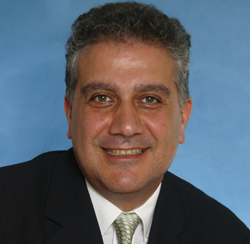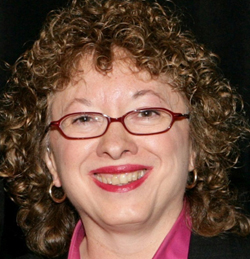Andy Saffarian was five months into his wireless technology startup after leaving a successful career at Intel when he learned his wife was expecting twins. A week later in May, 2007, Saffarian also learned he had stage 3 cancer.
A former Iranain artillery soldier who fought in the Iran-Iraq war, Saffarian admits he felt like a “dead man walking” after conducting initial internet research on his prognosis. When he started receiving treatment, many things didn’t make sense to this entrepreneur with two Master’s degrees and eight patents.
Why couldn’t he just carry his lab results up two floors at New York-Presbyterian Hospital instead of waiting for them to be faxed? Why couldn’t his surgeon simply retreive his bloodwork in less than a minute by using his PC to view it? Did nurses actually expect him to remember detailed instructions on how to replace his temporary colostomy only 72 hours after a 7-hour surgery and while on multiple pain medications?
Healthcare puzzled and frustrated this bright and steely patient and he became determined to do something about fixing it. Five years later, Saffarian is cancer-free and closer than ever to truly impacting the healthcare industry with his nearly three year-old startup ArioTech, which aims to virtually connect patients and healthcare professionals via its Medical Digital Assistany (mMDA) in an effort to improve quality of life for patients with chronic diseases and quality of care while lowering costs for care providers.
“If I had to summarize everything I had on my laundry list of things that could overcome the issues I faced, it would be in one word – communication,” says Saffarian, who endured two surgeries, multiple chemo sessions, and a clinical trial during his battle with cancer. “Based on my experience, I felt I could put something together that could help connect patients with healthcare providers.”
When he started ArioTech in 2009 out of his basement, Saffarian new electronic medical records (EMR) was already a crowded space, so the niche became focused on using available technology to help connect patients and care providers. While even that niche is more crowded three years later, ArioTech’s mMDA platform is poised to become a comprehensive, customizable tool that can improve patient care and save costs by linking the patient via a monitoring device and software.
A recent investment of $50,000 by Ben Franklin Technology Partners of Northeastern Pennsylvania is bringing ArioTech out of its Northern New Jersey-based virtual office and into Bethlehem’s TechVentures incubator facility. Saffarian expects to move in next week and is already in discussions with St. Luke’s Hospital in Bethlehem and Independence Blue Cross in Philadelphia about possibly introducing the company’s platform there.
Flying Kite: How did your cancer treatment influence how you built ArioTech?
(Andy Saffarian) I promised myself if I survived I’d utilize my technical expertise and help other patients to have an easier life. One time I was taking medication and one of the side effects was diarrhea. Here I am an education person but not knowing that when water comes out of my body, it needs to be replaced. Because of that I ended up in the emergency room. If I had mMDA and presented those symptoms, someone from my care provider could pick up the phone and say “Andy can you please drink some water?” That would have avoided thousands of dollars to be in the emergency room.
FK: How does the mMDA platform work?
AS: My vision is that every single person with chronic diseases carries a little box that pretty much monitors their whole body. The interaction of the body and that box and between the box and care provider will impact multiple stages of the decision process.
There are two keys to the platform. One enables the patient to streamline and aggregate various data or even use it for interactive communication with healthcare providers. The other piece is software that resides at the hospital or insurance company or, in the case of clinical trials, pharmaceutical companies, to monitor patients or collect data.
FK: In addition to your new office and talks with St. Luke’s, what else is happening with ArioTech?
AS: We are doing a clinical trial using mMDA core technology to validate our technology with Brown Medical School and Women and Infants in Rhode Island, which challenged us to use this device for a project they had in mind to detect and predict ovulation. We used mMDA with a wireless temperature sensor that was placed on female subjects to monitor their temperature continuously. We provided a daily questionnaire to fill out in the morning and at night. We’ve completed Phase I – data collection. Now we’re entering Phase II, analyzing the data to be able to detect and predict ovulation, which has never been done with wireless technology.
FK: How is mMDA pdifferent from competitors?
AS: mMDA is a unique, holistic and technologically advanced approach offering the next-generation multi-function patient health management capabilities. ArioTech’s approach, in contrast to its competitors, simplifies and streamlines care management by making it possible for diverse applications to run on one platform, eliminating the need for multiple tools, improving ease of learning and use, all at a lower cost. Both mMDA-Mobile and mMDA-Web Portal provide great flexibility, HIPAA security, with simple-to-use graphical interface for patients and care providers respectively.
In terms of competitiveness, what we did first was start with the patient’s needs in terms of making it very easy for patients of various ages to use it. The mMDA solution is designed to address the 10 percent of patients generating over 50 percent overall healthcare expenditure. There are lots of apps out there for targeted care but they’re aimed at the wrong audience – folks who already have computer skills. Some of our competitors are designing from the engineering mindset, not the end-user mindset. When we started talking to physicians, nurses, insurances companies and pharmaceutical companies, we tried to collect their requirements, and we believe our solution addresses multiple needs. The device even has a GPS.
FK: What are ArioTech’s plans for growth in the next 2-5 years?
(AS) ArioTech initial focus is to deploy mMDA for CHF patients due to recent CMS Readmission Reduction mandate. Hospitals plan to deploy for other Chronic disease including Cancer, Diabetes, Hypertension, COPD in phases. ArioTech is raising $500,000 in a Series A Preferred in 2012 at a $3.1 million, pre-money valuation to complete its pilots, with about one third of this circled, and then another $2.8 million in 2013 to bring it to profitability and to enable rapid growth. The company projects $25 million in revenues projected by year 4 and has the opportunity to grow to over $100 million and be very profitable.
— by Joe Petrucci


http://www.ariotech.com/
116 Research Dr. Bethlehem, PA 18015
↑ Top


